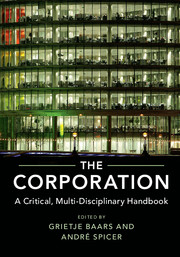Book contents
- Frontmatter
- Contents
- List of Contributors
- Acknowledgements
- Introduction: Why the Corporation?
- PART I DISCIPLINARY OVERVIEWS
- PART II INTERDISCIPLINARY THEMATIC CHAPTERS
- 1 The Evolution of the Corporate Form
- 2 The Multinational Corporate Group
- 3 The Financialization of the Corporation
- 4 Corporate Value Chains
- 5 Corporate Citizenship
- 6 The Corporation and Crime
- 7 The Corporation and Ideology
- 8 Corporation and Communities
- 9 Corporations and Resistance
- 10 Alternatives to the Corporation
- a Resisting and Regulating Corporations through Ecologies of Alternative Enterprise: Insurance and Electricity in the US Case
- b The Psychological Crisis of the Corporation: Employee-Owned Alternatives and Futures
- c Organization Is Politics Made Durable: Principles and Alternatives
- Index
- References
c - Organization Is Politics Made Durable: Principles and Alternatives
from 10 - Alternatives to the Corporation
Published online by Cambridge University Press: 31 March 2017
- Frontmatter
- Contents
- List of Contributors
- Acknowledgements
- Introduction: Why the Corporation?
- PART I DISCIPLINARY OVERVIEWS
- PART II INTERDISCIPLINARY THEMATIC CHAPTERS
- 1 The Evolution of the Corporate Form
- 2 The Multinational Corporate Group
- 3 The Financialization of the Corporation
- 4 Corporate Value Chains
- 5 Corporate Citizenship
- 6 The Corporation and Crime
- 7 The Corporation and Ideology
- 8 Corporation and Communities
- 9 Corporations and Resistance
- 10 Alternatives to the Corporation
- a Resisting and Regulating Corporations through Ecologies of Alternative Enterprise: Insurance and Electricity in the US Case
- b The Psychological Crisis of the Corporation: Employee-Owned Alternatives and Futures
- c Organization Is Politics Made Durable: Principles and Alternatives
- Index
- References
Summary
Introduction
There are many different ways in which the corporation might be subjected to critical scrutiny, and some of these lines of argument will end with the idea that new forms of economy and organization need to be explored. Not all of them, because other solutions will involve a stress on new forms of state or multilateral regulation which might ameliorate the problems, or on the strengthening of countervailing powers, such as trade unions, activists or consumers (Hadden et al., 2014). Whilst not dismissing such strategies, we would prefer to suggest that a new economy is required, a post-capitalist (and post-corporate) configuration which would play a part in solving many of the problems identified in this book so far. This chapter attempts to put forward an argument concerning how alternatives to the corporation might be evaluated. There are many different ways in which human beings might organize their affairs, but many of them – fascism, slavery, feudalism – are not progressive alternatives. So, if we are suggesting that we should ‘take back the economy’ from corporations (Gibson-Graham, 2013; see also Gibson-Graham, 1996; McNally, 2005; Gibson-Graham, 2006; Parker et al., 2007; 2014a; Davies, this volume), then what might these new organizations look like?
In this chapter we will explore just what sort of principles we might deploy to think about the question of alternatives. This paper is not a worked out normative theory for a post-corporate utopia. Instead, the key idea is that all forms of organizing are ‘political’, which is another way of saying that they are contested. They have upsides and downsides, and it simply isn't possible to say that there are some arrangements which are unambiguously good, and others that are unambiguously bad. Markets can be hugely helpful forms of reward and distribution in some circumstances, and communes can be oppressive and narrow places which crush participation (Freeman, 1972). Hierarchies of authority can be useful too on occasion, particularly for making quick decisions. What we want to bring out in this chapter is an awareness of the consequences of particular forms, and to always understand that there are other ways of doing things.
- Type
- Chapter
- Information
- The CorporationA Critical, Multi-Disciplinary Handbook, pp. 538 - 545Publisher: Cambridge University PressPrint publication year: 2017



